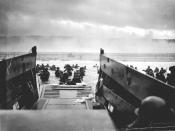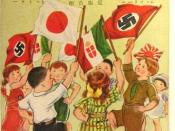During World War II, June 6, 1944 D-Day was a very important turning point for the Allies, as they launched a huge arsenal that began to push the Nazis away from France. Not only did this battle take many lives, but it was a difficult experience for the ones who fought on that date. The soldiers in the battlefield had a shocking day they would never forget.
Between the years of 1920 and 1940 dictators came to power in Germany, Italy, and Japan. In addition, Germany had critical economic problems after World War I. Therefore, as soon as the Nazi party came to power they promised to solve the economic problems while starting a dictatorship in Germany, led by Adolf Hitler in 1933. In 1939, Italy and Germany became allies, ÃÂcalling themselves Axis Powers.ÃÂ But the fact that Poland had received German territories under the treaty of Versailles after World War I angered the Nazis.
Consequently, Hitler started the massive invasion of Poland in September 1st, 1939 when the battleship Schleswig-Holstein opened fire to polish territory, followed by 62 German divisions and support of 1300 aircrafts.
World War II is the greatest conflict in human history involving a variety of countries fighting each other for a designated cause. ÃÂThis was the deadliest war ever,ÃÂ leaving more than 70 million dead and being the most widespread sanguinary event involving more than 100 million military personnel. Also, nearly 11 million of the civilian casualties were victims of the Holocaust, which was conducted by the Nazis in Eastern Europe.
The great global conflict split a majority of the world's nations into military alliances: the Allies and the Axis Powers. The Allies involved The United States, Great Britain, France and The Soviet Union. The Axis party was formed by Germany, Italy, and Japan.


